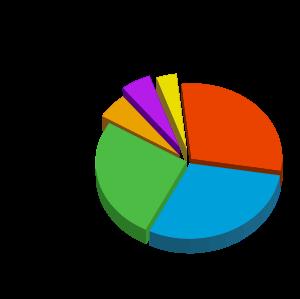A great number of words of French origin have entered the English language to the extent that many Latin words have come to the English language.According to different sources, nearly 30% of all English words have a French origin.This fact suggests that 80,000 words should appear in this list. However, this list does not include derivatives formed in English, but only the ones imported as such directly from French (for instance joy and joyous, but not joyful, joyfulness, nor partisanship, parenthood, …). It does not include either combinations of words of French origin with words of origin other than French (e.g. ice cream, sunray, jellyfish, killjoy, lifeguard, passageway). It also excludes English-made combinations of words of French origin (e.g. grapefruit is made of grape + fruit but has been coined in English, layperson: lay + person, consider also mailorder, magpie, marketplace, petticoat, straitjacket). This list does not include words that come from French but were introduced into the English language via another language than French (e.g. commodore, domineer, ketone, loggia, lotto, mariachi, monsignor, oboe, paella, panzer, picayune, ranch, vendue, veneer).Although French is mainly from Latin (which accounts for about 60% of English vocabulary either directly or via a Romance language), it also includes words from Gaulish and Germanic languages (especially Old Frankish). Since English is of Germanic origin, words that have entered English from the Germanic elements in French might not strike the eye as distinctively from French. Conversely, as Latin gave many derivatives to both the English and the French languages, ascertaining that a given Latinate derivative did not come to the English language via French can be difficult in a few cases.Most of the French vocabulary now appearing in English was imported over the centuries following the Norman Conquest of 1066, when England came under the administration of Norman-speaking peoples. The majority of the population of England continued to use their Anglo-Saxon language but it was influenced by the language of the ruling elite, resulting in doublets. Consider for example the words for the meats eaten by the Anglo-Norman nobility and the corresponding animals grown by the Anglo-Saxon peasants: beef / ox, mutton / sheep, veal / calf, pork / pig, or pairs of words pertaining to different registers of language: commence / start, continue / go on, disengage / withdraw, encounter / meet, vend / sell, purchase / buy. Words of French origin often refer to more abstract or elaborate notions than their Anglo-Saxon equivalents (e.g. liberty / freedom, justice / fairness), and are therefore of less frequent use in everyday language. It may not be the case of all English words of French origin though. Consider for instance: able, car, chair, city, country, fine, fruit, journey, juice, just, part, people, real, stay, table, travel, use, very, wait. After the rise of Henry Plantagenet to the throne of England, other forms of dialectal French may have gained in influence to the detriment of Norman French (notably the variants of Anjou where the House of Plantagenet came from, and possibly Poitevin, the tongue of Eleanor of Aquitaine). With the English claim to the throne of France, the influence of the language in use at the royal court of France in Paris increased. The cultural influence of France remained strong in the following centuries and from the Renaissance onward borrowings were mainly made from Parisian French, which became the de facto standard language of France.




Commenta
0